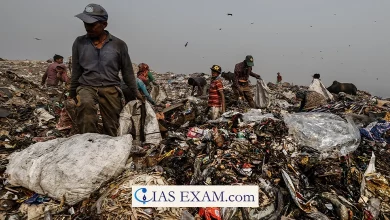Daily Current Affairs for UPSC
Virtual Asset Service Providers
Syllabus- International Relations [GS Paper-2]

Context
The Financial Action Task Force (FATF) has recently found that many countries are yet to fully implement its requirements aimed at preventing misuse of virtual assets and virtual asset service providers (VASPs).
Key highlights
- The Financial Action Task Force (FATF) has observed that many countries are yet to fully put in force its requirements geared toward stopping misuse of digital assets and virtual asset service providers (VASPs).
- The study found that India has already performed a hazard evaluation masking virtual assets and VASPs.
- The FATF is yet to assess and price India’s overall performance with regard to the revised requirements on digital assets and VASPs.
- The nations which have explicitly prohibited the use of virtual assets and VASPs are China, Egypt and Saudi Arabia, while it’s far in progress in Seychelles and Indonesia.
- The FATF said as digital assets had been inherently international and borderless, any failure to regulate VASPs in one jurisdiction could have serious global implications.
- The FATF added that terrorist agencies, consisting of ISIL, Al Qaeda and their associates, as well as ethnically or racially inspired terrorist entities, are also recognised to be more and more the use of virtual assets to raise and circulate funds globally.
About
- Virtual assets (crypto assets) refer to “any digital representation of value that can be digitally traded, transferred or used for payment”.
- A Virtual Asset Service Provider (VASP) is described through the Financial Action Task Force (FATF) as a business that conducts one or more of the subsequent moves on behalf of its clients:
- Exchange between virtual assets and fiat currencies
- Exchange between one or more kinds of virtual assets
- Transfer of virtual assets
- Safekeeping and/or administration or virtual assets or instruments allowing control over digital assets
- Participating in and provision of monetary offerings related to an provider’s offer and/or sale of a virtual asset
- This definition encompasses various crypto corporations which include exchanges, ATM operators, wallet custodians, and hedge funds.
About Financial Action Task Force (FATF)
-
- The Financial Action Task Force (FATF) is an intergovernmental organisation established in 1989.
- It is an initiative of the G7 countries to develop regulations to curb money laundering.
- In 2001, its mandate was expanded to include terrorism financing.
- It has also started dealing with virtual currencies.
- It sets global standards that aim to prevent these illegal activities and the harm they cause to society.
- It is a “policy-making frame” which matches to generate the political will to result in national legislative and regulatory reforms in money laundering.
- It monitors progress in implementing its guidelines by “peer critiques” (“mutual opinions”) of member nations.
- The FATF Secretariat is located in Paris.
- Members of FATF:
-
- The FATF currently accommodates 38 member jurisdictions and 2 regional organisations, representing most main monetary centres in all parts of the globe.
- India was an Observer at FATF in 2006. In 2010, India was taken in as the 34th country member of FATF.
What are FATF ‘Grey List’ and ‘Black List’?
-
- FATF has 2 types of lists:
- Black List:
-
-
- Countries known as Non-Cooperative Countries or Territories (NCCTs) are put in the blacklist.
- These countries aid terror funding and money laundering activities.
- The FATF revises the blacklist regularly, including or deleting entries.
-
-
-
- Countries which are considered secure havens for assisting terror funding and money laundering are put in the FATF gray list.
- This inclusion serves as a caution to the countries that it can enter the blacklist.
-
- Consequences of being in FATF Grey List:
-
- Economic sanctions from IMF, World Bank, ADB
- Problem in getting loans from IMF, World Bank, ADB and other nations
- Reduction in international trade
- International boycott
Source: The Hindu
UPSC Mains Practice Question
Q.Discuss how emerging technologies and globalization contribute to money laundering. Elaborate measures to tackle the problem of money laundering both at national and international levels. (2021)





.png)



